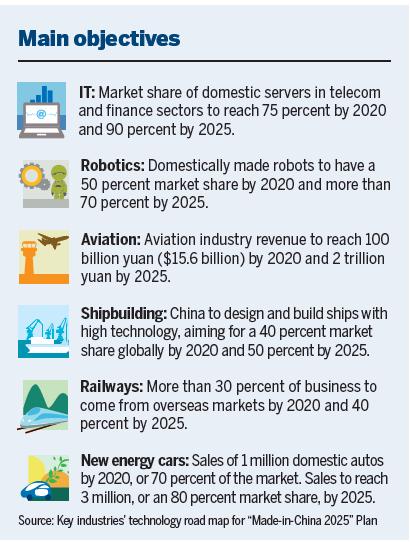A boy is fascinated by a robotic waitress at a restaurant in Haikou, Hainan province. [Photo/Xinhua]
Ten-year strategy includes increased use of locally made IT hardware in key sectors

Ten priority industries were identified on Tuesday by a key committee advising the central government on its "Made in China 2025" plan to upgrade the country's manufacturing sector.
The plan is aimed at moving the country away from low-end manufacturing to more value-added output.
The consultative committee's list includes new information technologies, numerically controlled machines and robots, aerospace devices, ocean engineering and shipping, and advanced rail equipment.
New energy vehicles, electrical equipment, agricultural machines, advanced materials, and biological medicine and medical instruments are also listed.
The committee will update the list every two years.
The State Council, China's Cabinet, unveiled the Made in China 2025 plan in May, in which domestic manufacturers are expected to make technological breakthroughs in emerging industries.
Xin Guobin, director of a 3-month-old office under the State Council that aims to spearhead the plan, said the guidance will play a vital role in increasing the country's manufacturing ability. Future industry policies will be implemented based on this guidance, Xin said.
The most eye-catching target is the greatly increased market share for Chinese servers.
The country is aiming for a 90 percent market share for domestic servers in the finance and telecommunications sectors by 2025.
Analysts said the target is designed to further squeeze the markets of overseas vendors such as IBM Corp and Hewlett-Packard Co.
China has never set out to oust imported IT hardware in the government procurement sector. But IBM, Hewlett-Packard, Cisco Systems Inc and many other technology giants are feeling the pain from a tightened grip on data security standards and checks. These companies did not immediately comment.
State-owned banks and telecom carriers are the biggest buyers of servers.
Chinese vendors only provide low-and midlevel products, with overseas companies catering to high-end demands.
The plan aims to increase the market share of domestic servers to 75 percent by 2020.
Chen Shanzhi, a member of the committee who was involved in setting the targets, said wider use of locally made IT hardware in key industries will help secure data safety.
"It will be a comprehensive project to keep our data safe. The country will try out more homemade servers, storage, operating systems and other basic software products in coming years."
Chen also said the market share of domestically manufactured basic software products in the finance and telecom sectors would increase to about 75 percent in 10 years. Local software makers have less than 50 percent of the market today.
But Wu Lianfeng, associate vice-president of industry consultancy IDC China, said it is virtually impossible for banks and telecom carriers to solely purchase servers produced by Chinese vendors because of the technology gap.
"A practical way of doing this is to make overseas multinationals join hands with local vendors and produce products that comply with Chinese regulations," Wu said.
